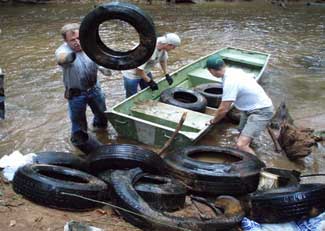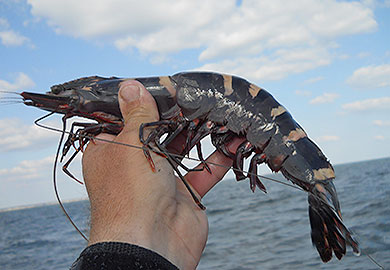Citizen Science Opportunities - Habitat Enhancements
Are you looking for an opportunity to volunteer your time helping wildlife? Are you willing to help collect data on species and their habitats? Maybe you want to teach others about fishing or hunting. Chapter 5 of the 2015 State Wildlife Action Plan lists education and outreach efforts as one of the fundamental strategies needing implementation in South Carolina to benefit priority wildlife species and their habitats. In particular, SCDNR and its partners should "promote volunteer participation, both in education and outreach programs as well as in data collection. [High priority]."
There are many opportunities for the public to help gather information that biologists and researchers can use in assessing species and their habitats. Sometimes our biologists need seasonal help with specific projects. That's when our volunteers become vitally important. Listed below are some citizen science weblinks. Some are for SCDNR programs while others take you to our conservation partners' websites.
Litter control

- Beach Sweep/River Sweep: Help clean up our waterways once a year Adopt-a-highway and help clean up terrestrial habitats as well!
- NOAA Marine Debris Division and the Southeast Atlantic Marine Debris Initiative (SEA-MDI), at the University of Georgia, have developed the Marine Debris Tracker mobile App. Use this iPhone or Android software record where you find trash on our coastlines and waterways.
- The SCDNR Shellfish Research Section needs your help reporting abandoned crab traps. For those wishing to use email, reports can be sent to crabtraps@dnr.sc.gov.
Invasive species control

- Recreational and commercial fishers are encouraged to report catches of Asian tiger shrimp in South Carolina to the S.C. Department of Natural Resources (SCDNR) at tigershrimp@dnr.sc.gov.
- The SCDNR is interested in the non-native Island apple snail, found in freshwater ponds. If these large snails or their bright pink egg casings are observed, please report the sighting to islandapplesnails@dnr.sc.gov or call 843-953-4985, including the following information: reporter name, date, location, and photograph (if possible).
- UCLA's Center for Embedded Networked Sensing (CENS), the National Park Service and the Center for Invasive Species and Ecosystem Health at the University of Georgia have coordinated to produce an App called Wild Spotter. Report the GPS coordinates of invasive species to researchers. Available for iPhone or Android.
- The South Carolina Exotic Pest Plant Council is a nonprofit, volunteer organization dedicated to providing a forum for the exchange of scientific, educational and technical information associated with the control of invasive plant species that threaten natural areas in the state. To help in the efforts for Early Detection and Rapid Response (EDRR), please report new occurrences in your county to EDDMapS.
Additional Habitat Enhancement Opportunities
- Watersheds – Watershed-related volunteer opportunities are available to the public through Clemson University's Center for Watershed Excellence and Carolina Clear.
- Monarch Watch promotes planting native plants like milkweed to help butterflies.
- The National Wildlife Federation certifies backyard habitats that meet the requirements for food, water, and shelter.
